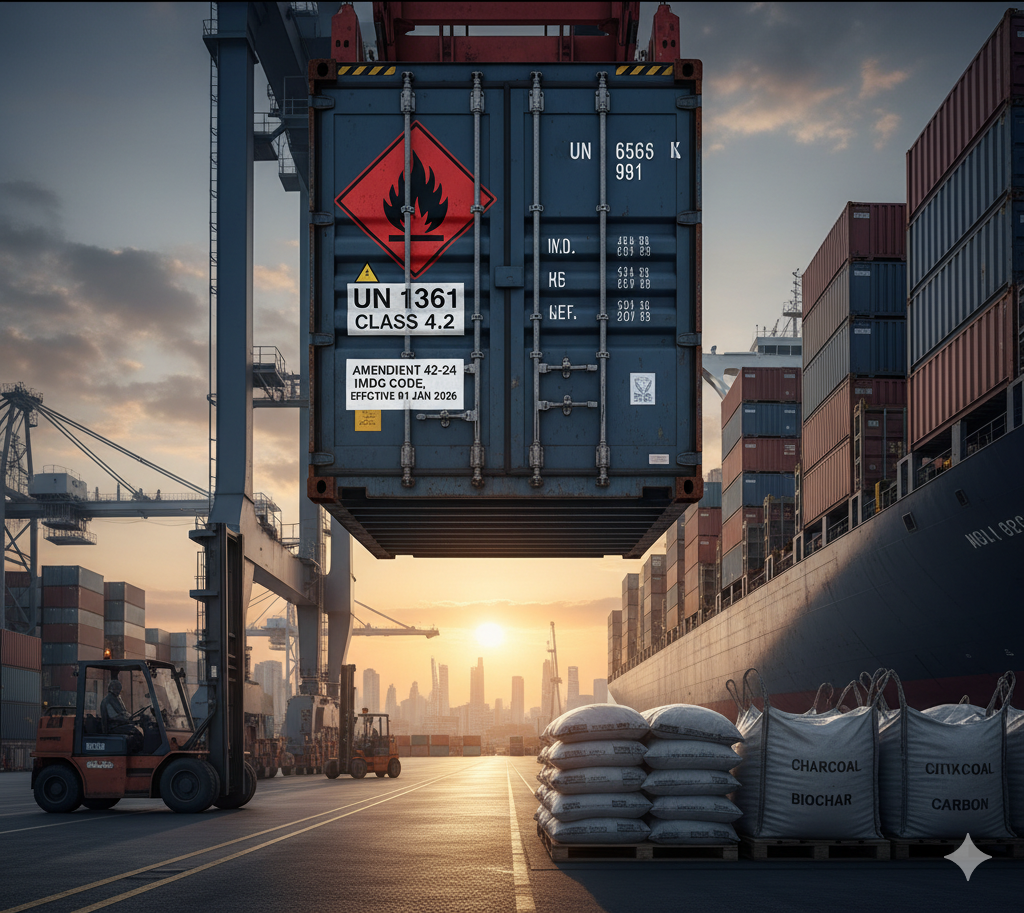A significant regulatory change is on the horizon for the global shipping industry. Under Amendment 42-24 to the International Maritime Dangerous Goods (IMDG) Code, all forms of charcoal, biochar, and activated carbon will be mandatorily classified as Dangerous Goods. This change, which removes previous exceptions, will come into full effect on 1 January 2026.
This update will have a substantial impact on a wide range of industries, from barbecue and food production to water filtration and agriculture. Companies that manufacture, ship, or use these products must prepare now to ensure compliance and avoid supply chain disruptions.
The Reason for the Change: Mitigating Hidden Dangers
The reclassification addresses the inherent and often underestimated risks associated with transporting carbon-based materials. While they may seem harmless, charcoal, biochar, and activated carbon pose two significant dangers in transit:
- Spontaneous Combustion: These materials are porous and can react with oxygen from the air in an exothermic process (a process that releases heat). Inside an enclosed space like a shipping container, this heat can accumulate, raising the temperature to the point of ignition without any external spark or flame. This self-heating property has been the cause of numerous container fires at sea.
- Oxygen Depletion: The same process that generates heat also consumes oxygen. In a sealed container, this can create an oxygen-deficient atmosphere, posing a severe asphyxiation risk to anyone entering the container for inspection or unloading.
Previously, some carbon products could be shipped as non-dangerous goods if they passed a specific test for self-heating substances. However, inconsistencies in testing and application have led to safety incidents. Amendment 42-24 simplifies the rules by classifying all these materials as hazardous, ensuring they are handled with the appropriate caution.
What Exactly Is Changing?
The new amendment specifically targets materials falling under these UN numbers:
- UN 1361: Carbon, animal or vegetable origin (includes charcoal and biochar)
- UN 1362: Carbon, activated
From 1 January 2026, all products under these classifications will be designated as Class 4.2: Substances liable to spontaneous combustion.
This means that all shipments of these goods must fully comply with the IMDG Code regulations for Class 4.2, which includes strict requirements for:
- Packaging: Using UN-approved packaging that is properly sealed and vented.
- Labeling and Placarding: Affixing the correct hazard labels on packages and placards on containers.
- Documentation: Preparing a Dangerous Goods Declaration (DGD) that accurately describes the shipment.
- Stowage: Storing the containers in safe locations on the vessel, typically on deck and away from heat sources.
Impact on Industries and How to Prepare
This regulatory shift will require businesses across the supply chain to adapt.
Key Impacts:
- Increased Costs: Shipping dangerous goods incurs higher freight charges and handling fees.
- Stricter Compliance: Companies must invest in training, updated documentation (like Safety Data Sheets – SDS), and compliant packaging.
- Logistical Challenges: Fewer shipping lines may accept Class 4.2 goods, or specific vessel stowage requirements could lead to delays.
Steps to Take Now:
- Review Your Products: Immediately identify all charcoal, biochar, or activated carbon products in your supply chain.
- Update Documentation: Revise all Safety Data Sheets and internal classifications to reflect the new Class 4.2 designation.
- Consult Your Logistics Partners: Open a dialogue with your freight forwarders and shipping lines to understand their specific requirements and plan for the transition.
- Train Your Staff: Ensure that all personnel involved in packing, handling, and documenting these shipments are trained on the regulations for Class 4.2 dangerous goods.
- Budget Accordingly: Factor the increased costs of DG shipping into your financial planning for 2025 and beyond.
While the mandatory implementation date is 1 January 2026, Amendment 42-24 may be applied voluntarily as of now. Proactive preparation is the key to a smooth transition and ensuring the continued, safe transport of these essential commodities.

